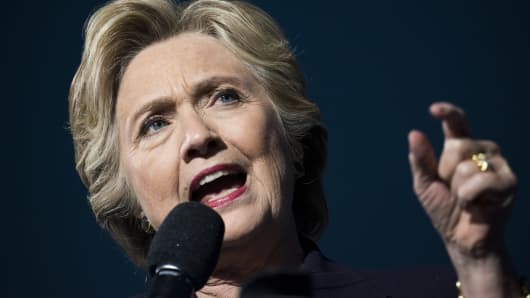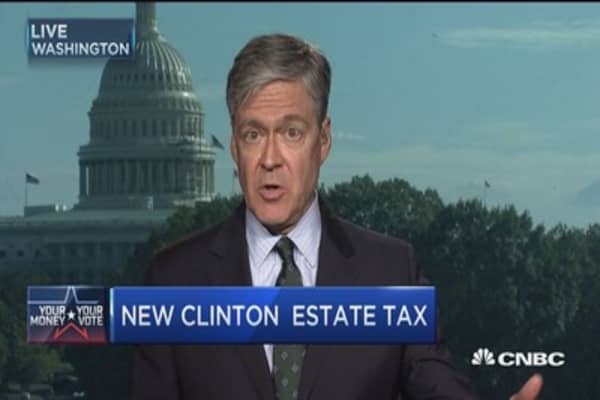
Presidential candidate Hillary Clinton has proposed increasing theestate tax to a top rate of 65 percent, arguing, in effect, that the rich have been getting away with murder and enraging small-business owners and farmers who worry a higher estate tax could put them out of business.
Clinton wants to cut the exemption for the “death tax” from $5 million today to $3.5 million, with a 45 percent tax on amounts between that and $10 million. She’d set a 50 percent rate on assets over $10 million, 55 percent over $50 million and 65 percent on amounts exceeding $500 million for an individual, $1 billion for married couples. As with the progressive income tax, each rate applies until the next threshold is reached, when the next rate kicks in.
The estate-tax increase would generate $75 billion over the next decade, according to the nonpartisan Committee for a Responsible Federal Budget. The tax increase and other new tax proposals from Clinton are to pay for her plans to simplify small-business taxes and expand the child tax credit.
Meanwhile, Donald Trump wants to get rid of the estate tax entirely, saying that would spur economic growth. But he would apply capital gains tax upon the owner’s death, with exemptions for small businesses and family farms on the first $10 million in assets.
But it is Clinton’s proposal that has drawn the most attention, because of its overall increase in the tax bite.
Though there is little evidence many businesses have gone under from estate taxes, it’s a hot-button issue for those who see the tax jeopardizing family assets like farms built over a lifetime — or several lifetimes. Groups opposed to estate taxes note that many small businesses, even if they survive, must give up an arm and a leg selling assets to pay the tax. Many, they complain, shoulder heavy expenses for strategies like buying large life insurance policies to soften the blow.
There are approximately 2.5 million small businesses and 90,000 farms worth more than $5 million in the United States, according to National Federation of Independent Business, potentially exposing many to the tax. But there is no exact figure on how many would be affected by Clinton’s tax increase.
“To levy a 65 percent tax means that the only way to pay it is to liquidate the asset — the entire asset.”
“The 65 percent tax rate that Hillary Clinton is looking to (impose) is only going to affect the super-rich, obviously a very small percentage of our population,” said tax lawyer David Hryck, a partner at Reed Smith in New York City. “Ultimately, I don’t believe it is going to raise much revenue as the super wealthy will continue to find ways to work around the tax.”
Other estate tax experts disagree. While Clinton’s higher estate tax rates would apply only to a minority of estates, opponents argue that farmers and business owners incur heavy costs preparing for estate taxes with strategies like buying large life insurance policies or setting up trusts.
The National Federation of Independent Business (NFIB) says 34 percent of its members report expenditures to prepare for estate tax, and says 90,000 U.S. farms are worth more than $5 million, potentially exposing many to the tax. It counts 2.5 million family-owned businesses in the country.
Estate tax opponents like NFIB say it is a particular problem for farmers and other small business owners because these enterprises often cannot be sold off piecemeal, the way a stockholder can sell just some shares to pay taxes.
“Small businesses and farms are illiquid; they lack access to a public market to readily convert ownership into liquid capital, especially fractional ownership,” explained asset-valuation expert Dan Doran, founder of of Quantive Valuations in McLean, Virginia.
THE DOMINO EFFECT
“To levy a 65 percent tax means that the only way to pay it is to liquidate the asset — the entire asset,” he adds. “There is no market for 65 percent of a farm or 65 percent of a small, privately held business.” That difficulty would hold true as well for estates taxed at lower levels, such as Clinton’s 45 percent starting at $3.5 million.
“It means that the family is losing control of their generational asset,” Doran continues. “To me this goes to the heart of the American Dream. We are a nation of entrepreneurs at heart, and often keep these sorts of assets in the family for generations. A tax like this is apt to change that dynamic.”
“I have a number clients who would be impacted by the Clinton proposals,” says tax expert Julian A. Fortuna, partner at Taylor English in Atlanta. “Her proposed dial back of the estate tax exclusions from $5.45 million to $3.5 million would have widespread impact on my client base.”
An additional concern is the fact that Clinton also wants to eliminate the “step up” that currently reduces capital gains tax on stocks, real estate, businesses or other appreciated assets left to heirs. Under current law, if an investor paid $10 a share for a stock decades ago and it is worth $100 at his death, the beneficiary who sells the stock is taxed only on the sales price minus $100 — the “cost basis” is the value at the first owner’s death, not what he had paid for the shares.
Clinton has said some farms, small businesses and estates below some unspecified level would continue to get the step up “to ensure this change only affects the high-income families.” Trump, too, would eliminate the step up and allow some exemptions, but hasn’t given details.
The Committee for a Responsible Federal Budget says Clinton’s step-up elimination could produce $150 billion in revenue over 10 years.
“I think that is kind of a stealth item in this whole plan,” said Bruno Graziano, estate tax expert at Wolters Kluwer-CCH, a tax-information firm in Riverwoods, Illinois. “That, of all the things she proposed, probably could be the thing that would affect the most people.”
The estate tax has been a roller coaster since first imposed in 1917, when 10 percent was levied on portions of an estate exceeding $5 million. At its peak in the 1940s it charged 77 percent on portions over $10 million, then 70 percent for amounts over $5 million from 1976 to 1982.
Then it gradually declined to today’s 40 percent, charged to amounts over $5.45 million.
PLANNING AHEAD
The tax applies only to amounts above a given threshold, and lower rates have often been charged to smaller estates. From the beginning, some portion of every estate has been exempt altogether — $50,000 in the early 20th century. One oddity: Since 2006, the exemption has been higher than the threshold at which the highest rate kicks in. So today the 40 percent rate technically begins at $1 million but doesn’t matter, because of the $5.45 million exemption.
Generally, each spouse in a married couple can get the full exemption with proper planning, if the first spouse to die leaves his estate to heirs rather than the other spouse, for example.
Opponents have long used the term “death tax” to emphasize what they think is the unfairness of using death as a reason to tax assets one has built over a lifetime, but the larger exemptions of recent years have dramatically reduced the number of estates that are actually taxed, from 7.65 percent of deaths in 1977 to 0.18 percent in 2013, or about 4,700 of the 2.6 million deaths, according to the Congressional Joint Committee on Taxation.
Of course, Clinton’s proposals are just planks in a platform. Most experts see little chance they will become law anytime soon, as the odds favor a split Congress even if she is elected and since Republican opposition to tax increases is solid.
Nevertheless, estate tax experts recommend business owners take some precautions under today’s law.
“I recommend that people looking to reduce their estate tax start by gifting money to their children,” Hryck said. “Each individual can gift $14,000 (a year) to each child tax-free, $28,000 as a couple.”
Trusts can also be used to escape tax on assets transferred to others, Hryck says, noting that to qualify a trust must be irrevocable, meaning that once given, the assets cannot be taken back. Trusts can shelter much larger sums than gifts of $14,000.
Among the types used, said Fortuna: Charitable Lead Trust, Generation-Skipping Trust, Grantor Retained Annuity Trust, Irrevocable Life Insurance Trust, Qualified Personal Residence Trust and Installment Sale to Grantor Trust. All need a lawyer and possibly an accountant to set up. While the nuts and bolts are different for each, they all shift assets to another individual or charity, making the trust-maker’s estate smaller to reduce the estate tax.
One consequence of a higher estate tax, likely unintended: It could drive the wealthy to more charitable giving. “When choosing between a 65 percent estate tax or setting up a family foundation, I believe some wealthy individuals will choose to make some charitable bequests rather than pay higher estate taxes,” said Ralph Bultman of Bultman Financial Services in Brookfield, Wisconsin.
Anyone likely to be impacted by higher estate taxes would be wise to get legal help, look into life insurance and to start accumulating cash to pay the tax, said Emory J. Smith, principal of EJS Financial Management in Phoenix.
There’s no getting around the fact that techniques for reducing an estate— giving to charity, or to friends and family — leave less for heirs. But these strategies afford the estate owner a measure of control that would be lost if assets built over a lifetime are passed to Uncle Sam.
source”cnbc”




